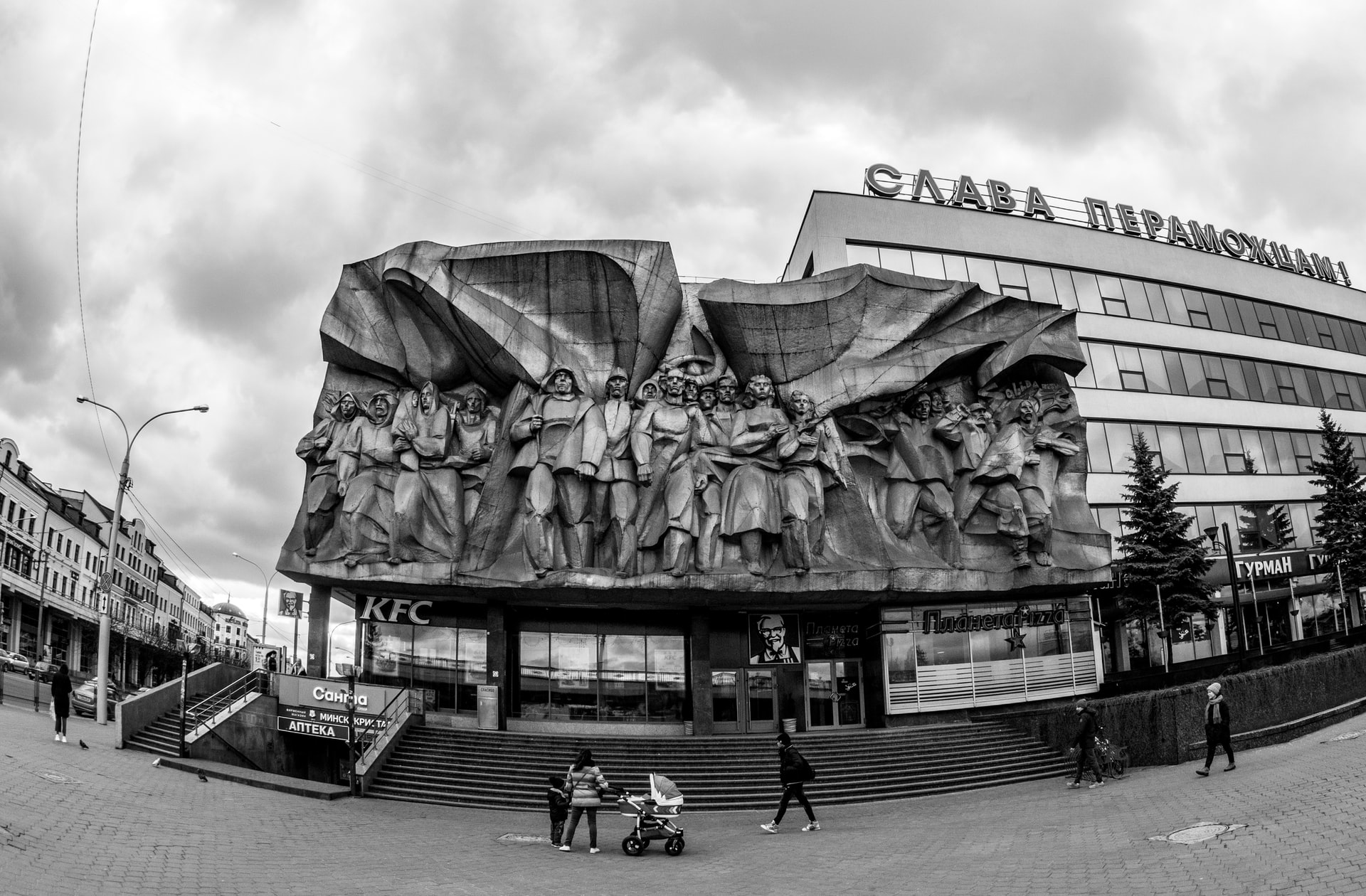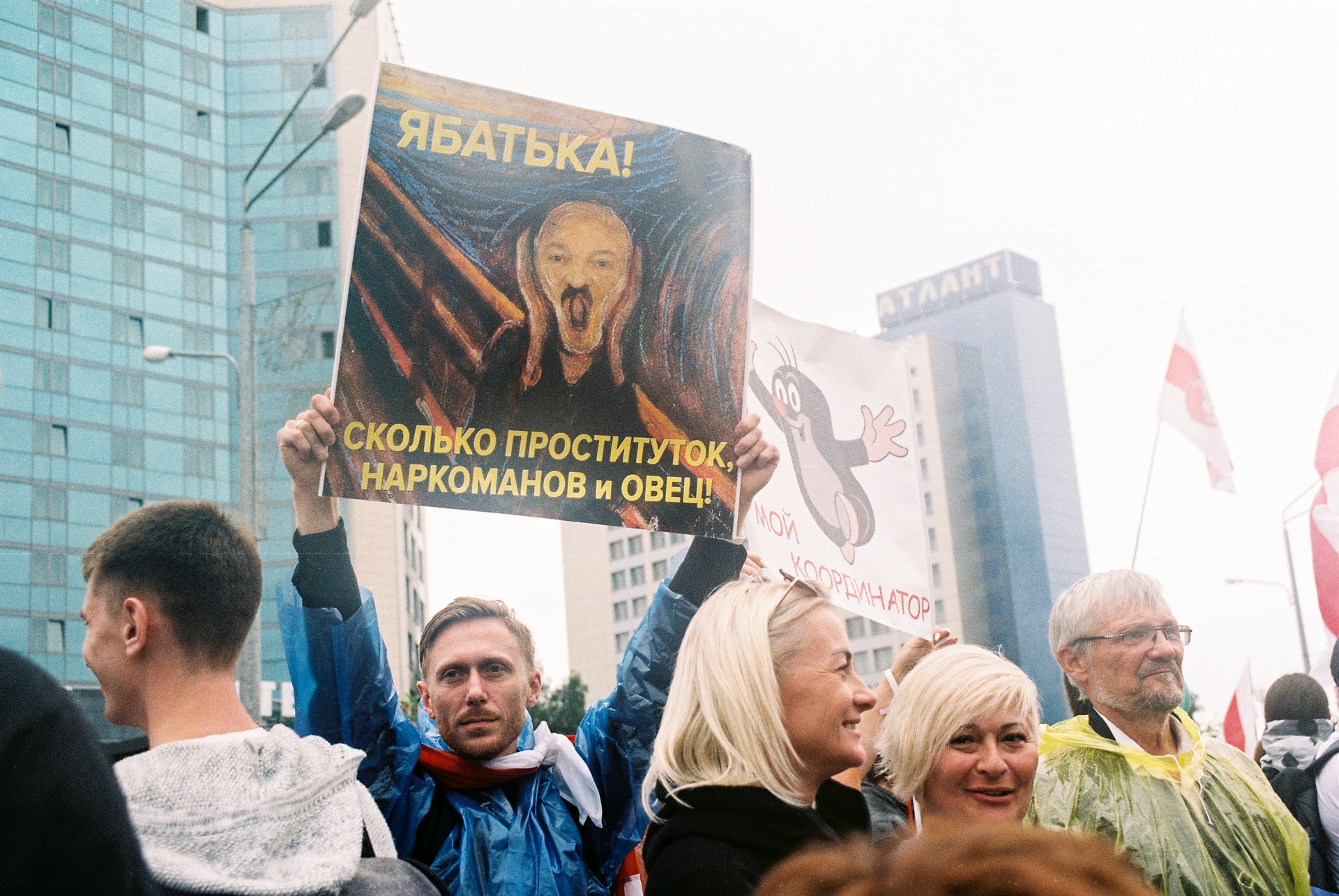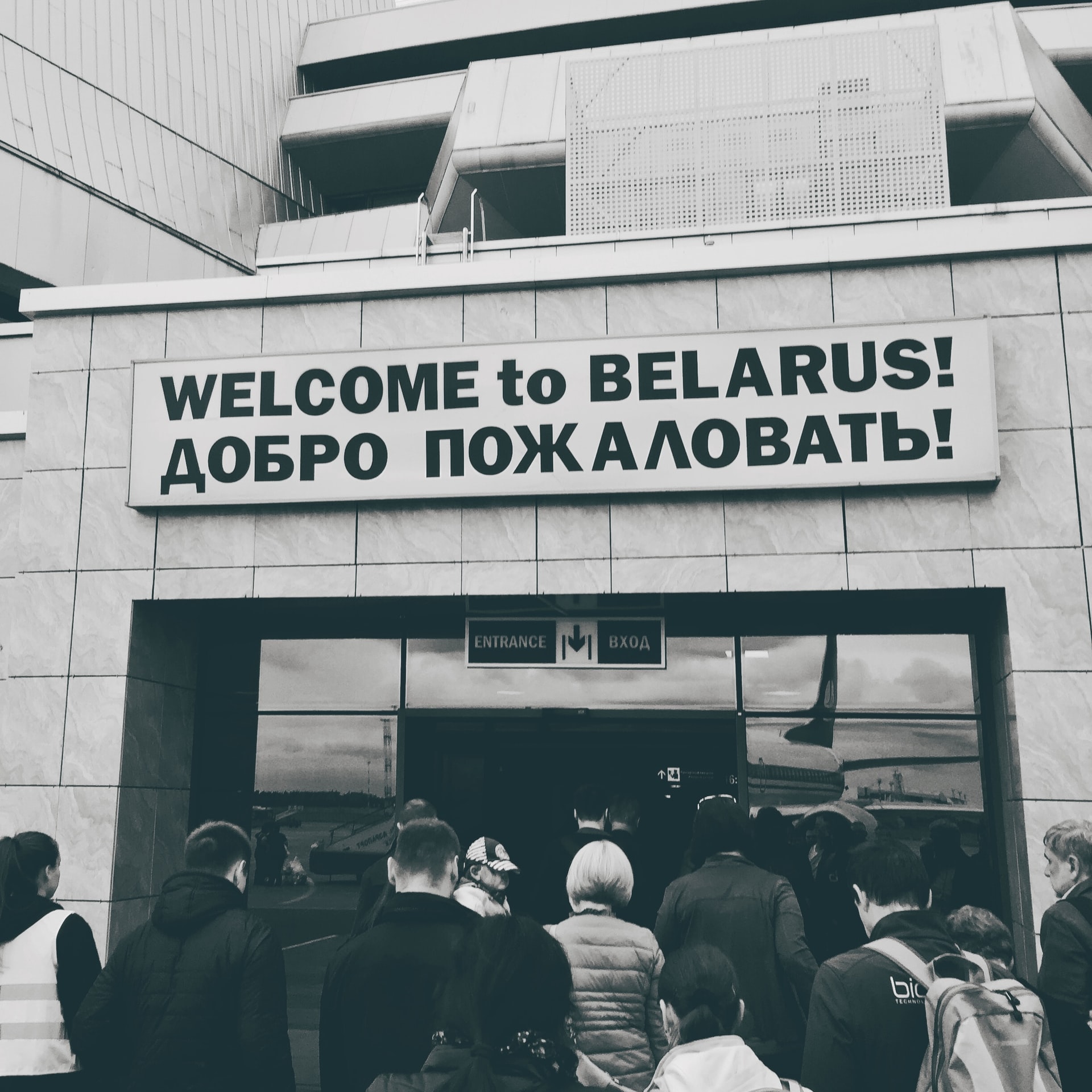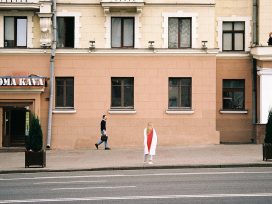After the short-lived international uproar surrounding last year’s elections, Belarus had fallen out of the headlines. Coronavirus, climate crisis, coronavirus, Middle East crisis, coronavirus… Suddenly, the steady flow of crisis news was interrupted by a fighter jet that scrambled and forced a passenger plane to land at Minsk airport. Two passengers were arrested: a 25-year-old man and 23-year-old woman. For a moment, the world turned its gaze back to Belarus to catch a glimpse of something that had been happening there every day for eight months.
Nowhere is safe
The authoritarian regime, initially assailed by mass protests after a rigged election in August 2020, has come out on top. The armed state apparatus has closed its ranks and is waging a campaign of revenge against anyone who dared, since late summer in 2020, to join protests for free and fair elections as well as basic human rights and to demand that those responsible for the security services’ beating and torturing of peaceful protestors be brought to justice.
Since then, the Lukašenka regime has been accumulating political prisoners. First, there were ten, then 50, then 100, then 200, and today, 28 May, there are 436. In the last week alone, 50 more people have been added to the total.
One of them is the captured air passenger Raman Pratasevič. In order to capture him, the Lukašenka regime was prepared to flagrantly interfere with international air transport. It put out a cock-and-bull story about an alleged bomb threat involving an e-mail from Hamas. The tale is ludicrous, so much so that one might think that the real point of the story is the audacity of the teller. Look, Westerners, see what we can get away with! You can’t stop us.
But this presupposes a shared understanding of law, when in fact none exists. From the point of view of the Belarusian regime, Raman Pratasevič, the journalist, blogger and co-founder of the Telegram channel Nechta, is a terrorist, arrested by means of a deft and perfectly legal little manoeuvre.
Naturally, the abduction of the plane also sends a signal to all those other ‘terrorists’ who have evaded capture by the Belarusian ‘forces of order’ – the representatives of the peaceful protest movement, who have fled the country, most of them to Lithuania and Poland, some to Ukraine and Germany.
The message is clear: you will never be safe. Not in the air, not on the ground, not in Vilnius, neither in Warsaw, nor in Berlin.
The same applies to the tens of thousands of traumatized and intimidated people who dared to take part in the hopeful days of August and September 2020 in but one protest march: to paint the three stripes, white-red-white, on a cheek.
For months, these thousands of people have had to face the daily fear of being arrested for taking part in mass unrest. They have had to contend with the possibility that after months in pre-trial detention, almost completely isolated from the outside world, they would be sentenced to up to five years in prison by a court that only registers as a mockery of the rule of law. The population is held hostage by a government anxious to prevent any unrest, any flare-up of protests.
To achieve this, the regime is prepared to pay a high price, as exemplified by this latest ‘little feint’, an obvious smokescreen. Reportedly, there is ample evidence that the pilot of the Ryanair plane did not land in Minsk acting on the instruction of the Belarusian air traffic controller to change course because of the alleged bomb on board. The course of the passenger plane indicates that the fighter jet forced it to land.
After receiving the news of the bomb, the aircraft did not embark on its planned route to Vilnius airport, but continued to fly at cruising altitude at full speed in the direction of Lithuanian airspace. The news of the direct involvement of the fighter plane is also supported by the record of the conversation between the pilot and the control centre in Minsk.
First, this record was broadcast on Belarusian state television, with the roles of pilot and dispatcher reversed in order to create the impression that the pilot had requested permission to land. Shortly thereafter, the Belarusian Ministry of Transport also published it. The record makes it clear that the pilot did not comply with the bomb warning: he asked questions; played for time; and, at 9:45 AM, managed to get the control centre to leave the decision to him and allow him to continue on his way out of Belarusian airspace. Then suddenly, two minutes later: ‘MAYDAY, MAYDAY, MAYDAY. We are declaring an emergency. Our intentions would be to divert to Minsk airport’.
What else but the fighter plane, very unlikely deployed to offer a security escort, could have prompted the pilot to make this decision, only two minutes from the safety of Lithuanian airspace, and when Vilnius was already much closer than Minsk?
Escalation and a clash of systems
These fragments paint a frightening picture: the political situation in Europe is worse today than it was during the East-West conflict of the 1970s, resulting from a mixture of Belarusian domestic developments as well and Putin’s foreign policy. The subtle competition for integration of the 1990s and 2000s between Moscow and Brussels has now escalated into an open clash of systems.
Indeed, all the institutions and forums where Europeans from East and West used to reconcile their interests and mediated their conflicts are now paralysed: from the OSCE to the Council of Europe (of which Belarus is not even a member); the partnership and cooperation agreements between Russia and the European Union; and from the EU’s Eastern Partnership to the NATO-Russia Council.
Two states that had pursued a seesaw course between Brussels and Moscow for three decades – Ukraine with more of a tilt to the West, Belarus with a lurch to the East – have now cemented their positions. Ukraine consolidated its stance in the West after the political upheaval in 2014. The front line has cut through the country since Russia occupied and annexed Crimea, as well as the targeted fuelling of conflict in southeastern Ukraine. And now, since October 2020, Belarus’s position has also been hardened: it’s been relegated to the East as Russia’s dependent vassal state.
The conflict takes place on all levels: within societies, between states and across political, economic and ideological divides. The regimes in Moscow and Minsk are employing means that even the Soviet Union wouldn’t resort to in the 1970s. Soviet dissidents were tried in public. The trials of many political prisoners in Belarus today are conducted secretly behind closed doors. Supporters who gathered at the gates of the court buildings to show their solidarity and provide comfort for the persecuted have been arrested and detained for ‘disturbing peace’.
Yet, the public confession, the most important element of the show trial, is imported into these secretive procedures, as now in the case of Raman Pratasevič and Sofija Sapega. The videos recorded in the Minsk KGB prison and subsequently distributed via the state media show clear signs of being coerced under torture or the threat of torture. Nevertheless, in the sham legal procedure they’re still used as evidence. The key is the political message: everyone has to see that the regime can break people in order to impose its narrative.

Photo montage from Sofija Sapega’s confession video as published by the Belarusian security service after her capture.
The most glaring example of Belarus’s legal nihilism is the criminal prosecution of Maksim Znak. As the lawyer of Maria Kolesnikova, a symbol of the peaceful protest movement in August, Znak had taken meticulous care to comply in every detail with even the most repressive laws. And yet the 30-year-old has been imprisoned for 260 days and is facing a long prison sentence for ‘conspiring to excercise subversion and found a terrorist organisation’.
All of these proceedings also reveal a state of unlawful rule. In Brest, two dozen people have been sentenced to a year and a half in prison or in a correctional institution for participating in a circle dance during a protest march in September. After a policeman knocked a woman down with his fist, a random passer-by rushed to the aid of the woman lying on the ground, but got between her and the militiaman: ‘resistance to state power’, imprisonment.
In terms of international connections and access to independent sources of information, Belarus is heading toward the darkest standards of the Soviet era. They’re not quite there yet, but the closure of the news portal tut.by in mid-May marked the end of the last independent media outlet. At the time of Raman Pratasevič’s arrest, 34 journalists had already been in custody. Foreign media is still available, but many Belarusians are afraid to access it, fearing their phones and computers may be monitored.
The conflict also plays out on the ideological front. Unlike the days of the East-West divide, there is no confrontation between capitalism and communism. The Putin regime does not offer an alternative idea for a fairer arrangement of state and society. On the contrary: it is rooted in the negation of the very idea of law and justice. These concepts are stylized as lies whose only purpose is to blind and weaken Russia and her people in order to subjugate them. The sociologist Lev Gudkov called this ‘negative mobilisation’.
But things have long been otherwise in Belarus. For two decades, the Lukašenka regime has presented itself as the last remnant of the Soviet Union, an island where a strong state and an authoritarian society ensure a greater measure of social justice than anywhere else in the region.
This was more than just ideology. But the system had a flaw. It was not economically viable, as it was mostly based on one thing: oil. Belarus, like Russia, is a petrol state whose success or failure depends on international oil prices. Belarus does not produce oil but processes Russian raw material. When the 2000s price surge was over, stagnation kicked in, as it did in Russia, which seriously eroded the system. Since 2015, the attempt to diversify the economy by opening up and liberalizing it has been actually quite successful. But the same process also launched the emancipation of civil society. The conflict between the authoritarian state and a changing society erupted in the summer of 2020. After 26 years of autocratic rule, it seemed that the opportunity had emerged to shake off the yoke of dictatorship.

Minsk downtown. Photo by Aliaksei from Unsplash.
The regime lashed back with unmasked violence and the retaliation is ongoing, hapening as it does every single day. Now, there is no turning back. Another authoritarian social contract is no longer possible. Repression is the only means left. The island has been locked up.
What can be done?
How can European states help Belarusian society find a way out of this daily horror? The dilemma, which has been revealed starkly by the isolation of the Belarusian air space after the capture of the aircraft, is clear. On the one hand, the EU is sending an important signal. On the other hand, by late December, the regime in Minsk had largely closed its land borders with Lithuania, Poland and Ukraine. The COVID restrictions on international travel have also added to the picture. Air transport was the main lifeline connecting Belarusian society with Western Europe. Now it has been cut off.
It’s the same with almost all other conceivable sanctions. The harsher they are, the more they will impact civil society. This applies to the suspension of international payments; to Belarus’s expulsion from international capital markets through which the country has been refinancing a fifth of its national debt; to any embargo on the fertilizer exports which are crucial for the Belarusian economy; and, above all, to any oil embargo. These restrictions could be partially compensated by or circumvented with Russia’s help. The closure of export routes via Lithuania has already turned the port of Saint Petersburg into an important transport hub for Belarusian goods.
Even if sanctions succeed in bringing about economic decline, it is unclear whether this will destabilize the regime. As things stand, the government is no longer based on consent, but only on intimidation. It is safe to assume that this intimidation is not only directed at society at large, but also at the state apparatus. Many in the Ministry of the Economy or the Ministry of Foreign Affairs, for example, oppose the repression. Yet, they have no choice but to close their eyes and save the little that can be saved.
There is another scenario, more likely than a rapid collapse and subsequent democratic dawn: namely, that the regime in Minsk is on its way to turning Belarus into a European North Korea, with effective sanctions only exacerbating the process.
There is still the option of targeting sanctions at representatives of the ruling elite. While these are important, one should not expect too much from them. The regime has long been sealed off and will not be able to turn back. Beyond symbolic punitive measures, this renders ongoing support for Belarusian civil society as the most important means. Daily, detailed work by word and deed is required to stave off resignation.









